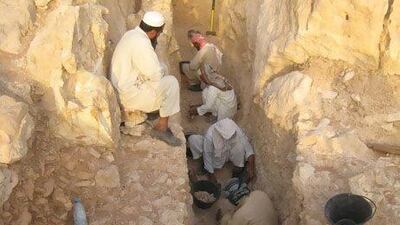DUBAI // Prehistoric human settlers may have moved to the region about 120,000 years ago because it was a fertile and green land.
The conclusion comes after archaeologists spent the past three years analysing sediment at a paleolithic settlement in Jebel Faya, Sharjah.
They found that in periods when human artefacts were discovered, there was corresponding evidence of increased rainfall and greenery.
"This area was very wet, and we think the entire interior and parts of the desert must have been green at that time," said Dr Knut Bretzke, who has overseen research at the Jebel Faya site since last year.
The research is currently in print, and will probably appear in the next issue of the journal Quaternary International.
It represents the second stage of exploration at Jebel Faya, a site that became the subject of intense debate two years ago when discoveries there threw into doubt widely-accepted theories about human development.
Previously, many palaeoanthropologists had believed that modern man developed in East Africa about 200,000 years ago, but only ventured out of Africa 60,000 to 70,000 years ago. However, those ideas were challenged when findings of what are thought to be human settlements at Jebel Faya from 120,000 years ago were published in the journal Science in 2011.
The artefacts found at the site were similar to those found in similar settlements in East Africa, prompting speculation that migration had occurred earlier than first thought. However, some scientists remain unconvinced, and argue that the artefacts discovered at Jebel Faya could have been made by earlier hominid species and not Homo sapiens.
Dr Bretzke said the issue had still not been resolved. "There is still strong debate about this topic now and at present there's little conclusion," he said.
His research involved taking two sediment columns from trenches at the dig and subjecting them to complicated analysis and dating methods.
In places where artefacts were discovered at the site, there was also evidence of grassland and trees. The researchers also found the earliest evidence for date palms in the region to date.
But in periods when there was no apparent vegetation as a result of a more arid climate, no human artefacts were found.
"We do not have evidence of human occupation of the area during dry periods," said Dr Bretzke. "But as conditions change, animals are once again attracted by an increase in vegetation cover and mobile hunter-gatherers will follow them and come back."
The first settlements at Jebel Faya date to about 125,000 years ago, right in the middle of the last interglacial period, which lasted from about 131,000 to 114,000 years ago. Interglacial periods are when the ice sheets melt, sea levels rise and the world's temperature generally becomes warmer.
We are in the middle of an interglacial, named the Holocene, which is not as pronounced as its immediate predecessor.
Andrea Dutton, assistant professor of geological sciences at the University of Florida, published a paper in Science in 2009 that found sea levels and temperatures were higher then than today.
"In terms of the global climate, the average global temperature was about 1.5 to 2 °C warmer than pre-industrial temperatures and the poles were about 3 to 5 °C warmer," she wrote.
"The global average sea level was 6 to 9 metres higher than present, meaning that portions of the Greenland and Antarctic ice sheets had melted relative to their present size."
She said that the evidence of increased rainfall at Jebel Faya 120,000 years ago, compared with today, could have been a regional attribute rather than a global trend.
"There is no compelling evidence at present that the wetter conditions at Jebel Faya during the last interglacial was a global phenomenon," she said. "Local temperatures and precipitation patterns can be quite different from the global average, leading to a diversity of environmental conditions across the globe."
She added that it would be plausible to say that humans migrated to the area because of greater rainfall there, but that would require further analysis of surrounding areas.

